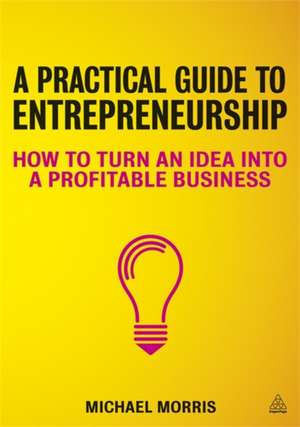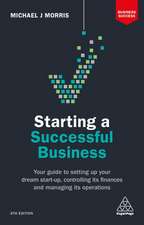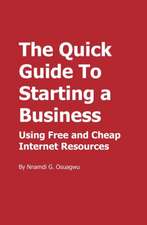A Practical Guide to Entrepreneurship – How to Turn an Idea into a Profitable Business
Autor Michael J Morrisen Limba Engleză Paperback – 2 noi 2012
Entrepreneurship has long been just another field of academic study, but now many students are looking towards self-employment as a career. Offering a practical action plan, rather than just discussing theory, A Practical Guide to Entrepreneurship combines well researched understanding of entrepreneurship issues with guidance in the form of case studies, exercises, advice and tips. Offering a solid learning experience and a contemporary overview of the subject, the book will benefit undergraduates and postgraduate students. Taking readers through each step of the start-up process, covering: planning, marketing, selling and advertising, finances and business law, this book will also appeal to people who are thinking of starting their own business.
The author includes sections on generating and screening ideas, summaries of academic models and theories, information on new developments in the field, as well as a glossary and appendix listing useful books, websites and links to 200 online video lectures. There are 20 mini case studies of entrepreneurship in action from around the world. Informed by UK practice but offering much to the international would-be entrepreneur, this book includes learning resources that stress the practical through leadership tests, start-up checklists, 380 downloadable Powerpoint slides and other valuable supplementary online material for students, teachers and entrepreneurs.
Preț: 272.75 lei
Nou
Puncte Express: 409
Preț estimativ în valută:
52.19€ • 55.81$ • 43.52£
52.19€ • 55.81$ • 43.52£
Carte tipărită la comandă
Livrare economică 17 aprilie-01 mai
Preluare comenzi: 021 569.72.76
Specificații
ISBN-13: 9780749466886
ISBN-10: 074946688X
Pagini: 304
Ilustrații: black & white illustrations, black & white tables
Dimensiuni: 170 x 244 x 17 mm
Greutate: 0.52 kg
Editura: Kogan Page
ISBN-10: 074946688X
Pagini: 304
Ilustrații: black & white illustrations, black & white tables
Dimensiuni: 170 x 244 x 17 mm
Greutate: 0.52 kg
Editura: Kogan Page
Cuprins
Acknowledgements
Introduction
Part 1: Entrepreneurship
01 Entrepreneurship today
In this chapter
Conclusions
02 Becoming and being an entrepreneur
In this chapter
Characteristics of entrepreneurs
Where and how
Conclusions
03 Not-for-profit (NFP) entrepreneurship
In this chapter
Entrepreneurship and the NFP sector
Conclusions
Part 2: Evaluations
04 Business ideas - creation and evaluation
In this chapter
Creativity and innovation
Evaluation
Conclusions
05 Running a business yourself
In this chapter
The demands of entrepreneurship
Personal characteristics
Personal finances - spring-clean while you can
Pay and rations
Using advisers
Conclusions
06 IT strategy
In this chapter
Trading on the web
Conclusions
Part 3: Customers and profits
07 Markets, market research and forecasting
In this chapter
Markets, customers and consumers
Researching the market
Forecasting
Conclusions
08 Your proposition and pricing
In this chapter
The customer proposition
Pricing your proposition
Conclusions
09 Channels of distribution
In this chapter
Getting it to the consumer
Conclusions
10 Marketing communications
In this chapter
Knowing what you want to say
Effective advertising
The web and your market
Other new media
Conclusions
Part 4: Financial management, raising finance
11 Costing
In this chapter
Working out an hourly rate
Keeping an eye on costings
Conclusions
12 Controlling cash
In this chapter
Cash matters more than anything else in a business
Keeping on top of the cash
Foreseeing the cash position
Why cash-flow forecasting matters
Conclusions
13 Further financial planning
In this chapter
Profit planning
How to trade unprofitably
Breakthrough to profit
Clever costing: the contribution method
Conclusions
14 Credit control
In this chapter
Credit control in practice
Conclusions
15 Sources of finance
In this chapter
The need for finance
Dealing with banks
Investors and others
Conclusions
Part 5: The law and the firm
16 Business legal entities and business names
In this chapter
Business legal entities
Naming the firm
Conclusions
17 Criminal and civil law as they affect business
In this chapter
Civil law and criminal law: two separate codes
Tort
Conclusions
18 The law of contract
In this chapter
The firm's contracts
Other legal matters
Conclusions
Part 6: Premises, operations, records and taxation
19 Premises - options and implications
In this chapter
Premises
The planning system
Rates, and water and sewerage charges
Conclusions
20 Planning, control and purchasing
In this chapter
Planning of operations
Control of operations
Purchasing
Conclusions
21 Safety and quality
In this chapter
Safety at work
Quality
Conclusions
22 Financial records and taxation
In this chapter
Financial management
NI, pensions, income and corporation taxes
VAT
Conclusions
Part 7: Employing staff
23 Why employ, planning to employ and employment law
In this chapter
Why employ staff?
Planning to employ people
Legal aspects of employment
Conclusions
24 Executing the recruitment plan
In this chapter
Moving on from the plan
Conclusions
Part 8: Managing risk, developing the firm
25 Risk management and insurance
In this chapter
Strategies for risk management
Insurances
Conclusions
26 Expansion and culture
In this chapter
Expansion
Culture
Conclusions
27 Leadership and management
In this chapter
Leadership
Management
Conclusions
Part 9: A systematic approach to growth
28 The PLG© Programme
The PLG Programme: Prepare, Launch, Grow©
Learning resources
In this section
Associated resources
Copyright
Mini case studies
Suggested topics for class and group discussion
Theoretical models
Sample assignments and notes
Appendix 1 Cash-flow forecasting explained
Appendix 2 Draft terms and conditions of sale
Appendix 3 Starting a green business
Useful websites
Selected (free) websites useful to start-up entrepreneurs
Websites for further information on aspects of entrepreneurship
Glossary
References
Index
Notă biografică
Michael Morris has taught for university business schools, contributed regular columns to business magazines and has extensive experience consulting to small firms. He is also the author of Starting a Successful Business, published by Kogan Page.
Descriere
A combination of well-researched understanding of entrepreneurship issues with guidance in the form of case studies, exercises, advice, and tips that offers a solid learning experience and a contemporary overview of the subject. The book will benefit undergraduates, postgraduate and MBA students.

















